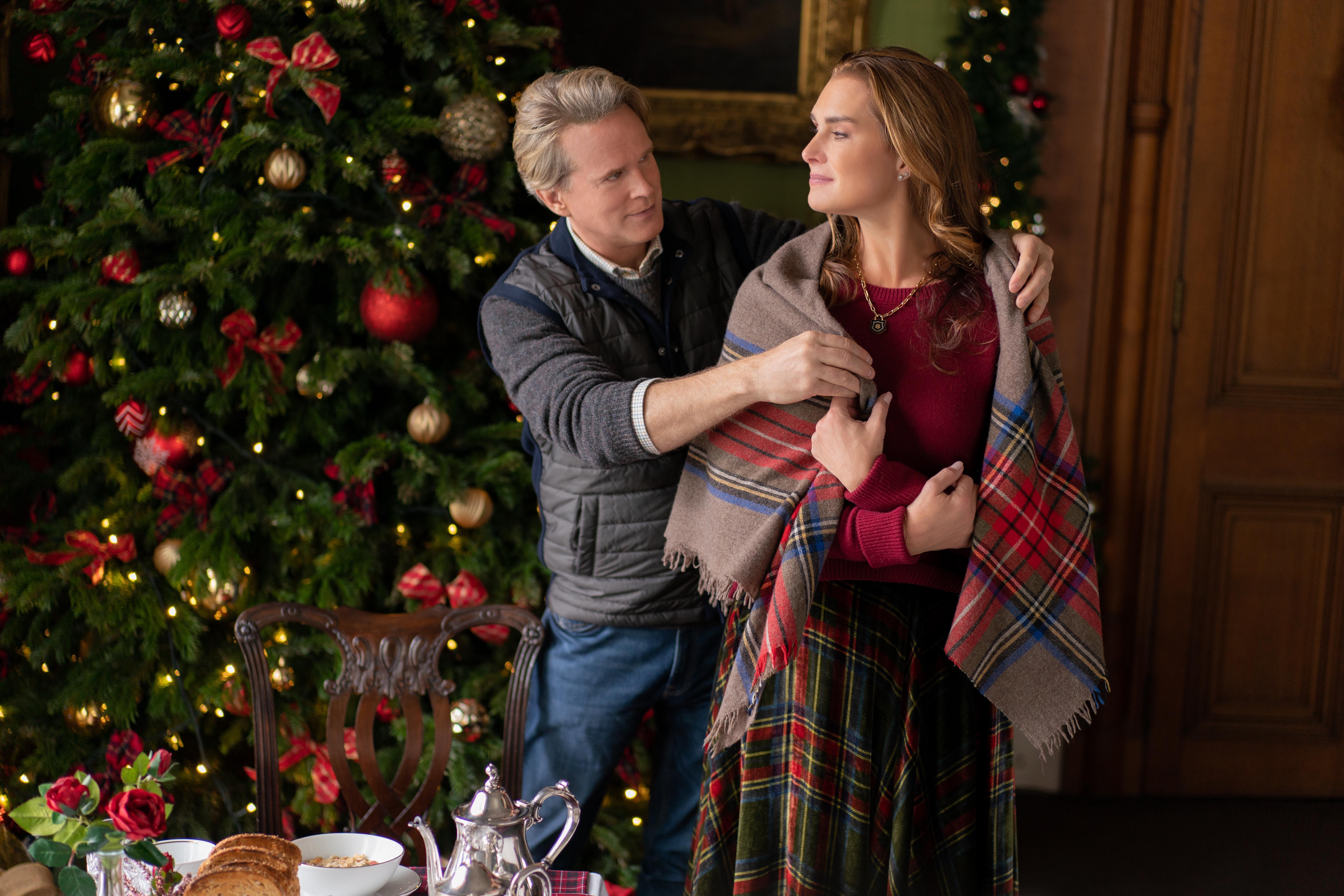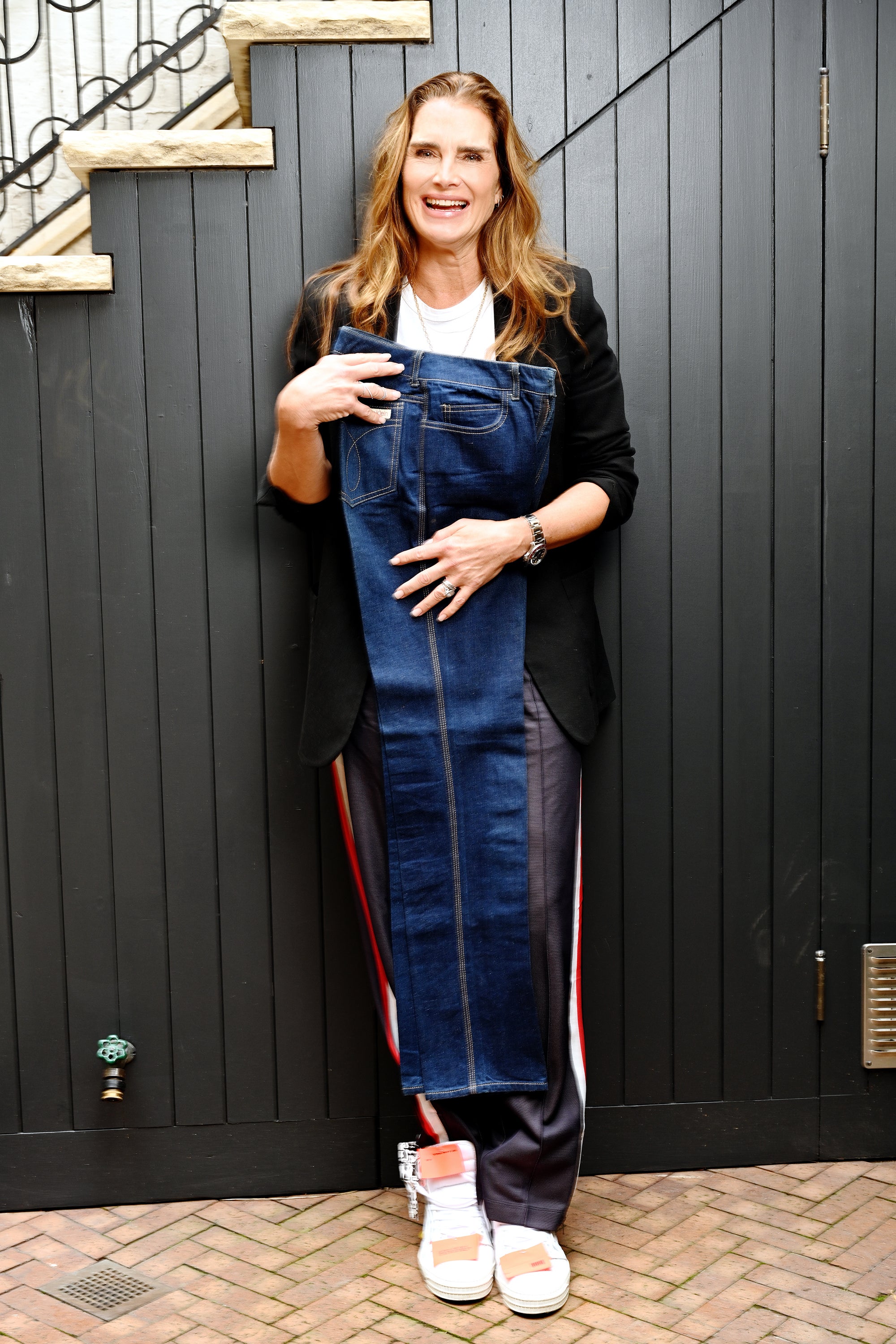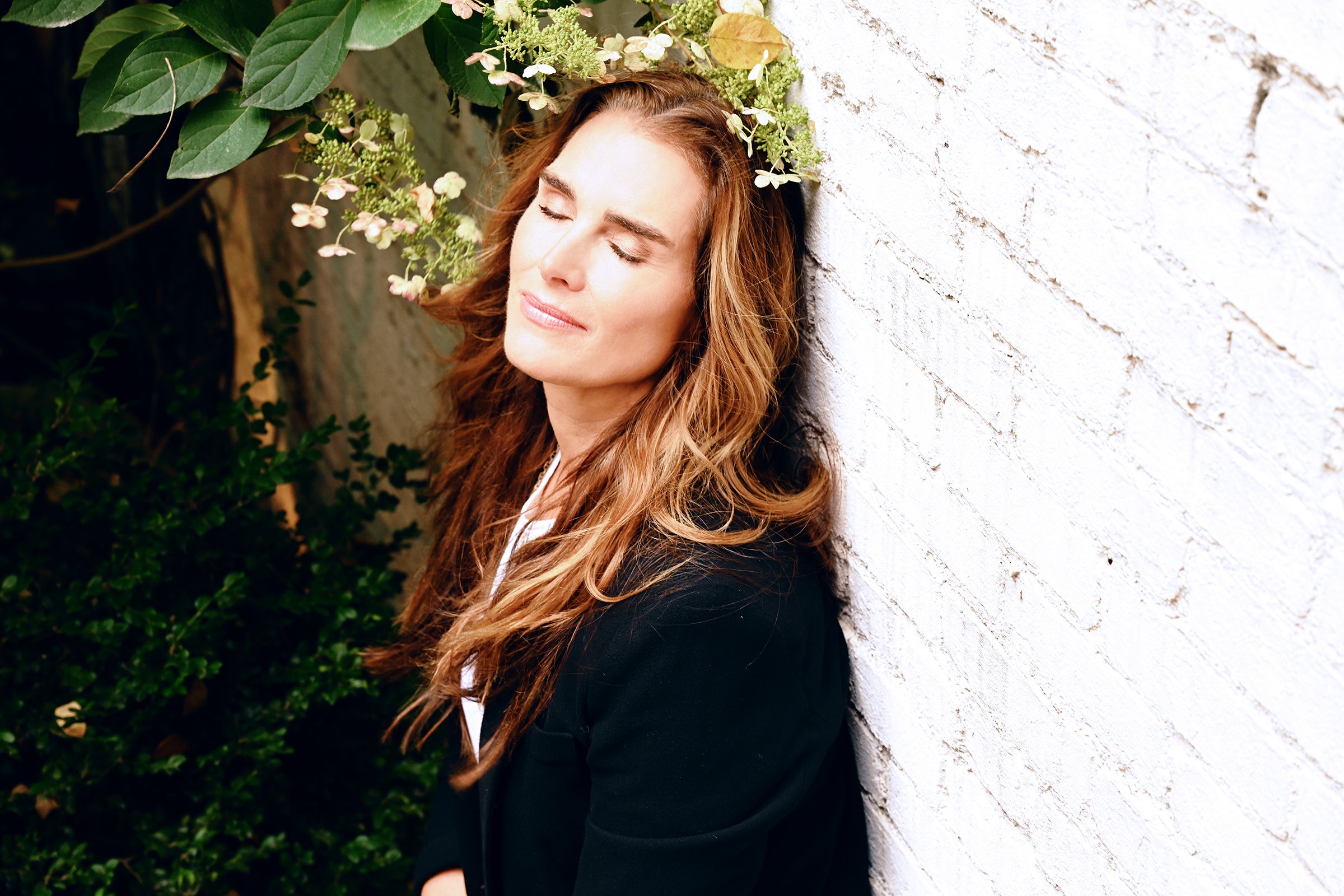Brooke Shields: ‘If I could, I would be doing romcoms and sitcoms 24/7’
Brooke Shields’s new Christmas movie, ‘A Castle for Christmas’, is a pure comfort watch, and the rare film centred on a woman over 50. Ashley Spencer spoke to her about her career and desire for lighter material

Brooke Shields can’t stomach Squid Game. The previews alone signalled to the 56-year-old that watching the violent survival drama “would not be healthy for me”. Even bingeing the bawdy Sex Education can be a bit much for her at times. Instead, she longs for cozy viewing escapes, like the new Christmas rom-com she stars in and executive-produced for the Netflix crowd who, like herself, simply wants to live, laugh, love this season.
“If I could, I would be doing romcoms and sitcoms 24/7,” she tells The Washington Post during a recent video call from her home in New York. “To me, that is my happy place.” Wearing oversized glasses and a creamy Nike zip-up sweatshirt, Shields’s brunette hair falls around her shoulders in casual waves while layers of necklaces and rings as eclectic as her career complete the look – a chunky gold smiley face signet on her hand, a delicate key dangling from her neck.
During the height of the pandemic in 2020, Shields journeyed to Scotland to film A Castle for Christmas, the aforementioned Netflix offering, directed by Mary Lambert, that will premiere on 26 November. In it, Shields plays a celebrated author who travels to Europe to purchase a castle and ends up meeting a romantic lead in the form of a crotchety Scotsman, played by The Princess Bride star Cary Elwes. It’s a pure comfort watch, and the rare film centred on a woman over 50.
“There’s this whole era that I’m walking into, and I’m seeing it out there being less represented. You go from Gen whatever to Depends,” Shields said of the lack of roles for women who are not ready to be relegated to supporting grandmother parts. “Why is menopause just associated with being crusty and old and dried up? I am better now than I was ever before. I’m more focused and more confident. I feel sexier. I understand my body more. I’m fitter.”
But despite Shields’s proclivity for feelgood fare and her generally perky demeanor, the actress is “not all Pollyanna,” stresses Lambert, who is best known for directing the 1989 horror flick Pet Sematary. “She’s got a dark, crazy sense of humour. She can talk trash like the best of them.”
Shields’s unconventional life has been breathlessly documented. Born and raised in New York City, she is the product of Teri, a socialite and model, and Francis, a businessman, who separated after just a few months of marriage when Brooke was still a baby. At the tender age of 11 months, or “zero” as Shields jokes, she began modelling before landing her first major film at 11 years old, playing a child sex worker and appearing nude on screen in Louis Malle’s Pretty Baby. By 14, she was in the primal island romance The Blue Lagoon. At 15, she fronted a Calvin Klein jeans ad campaign, positing in one famous spot, “You wanna know what comes between me and my Calvins? Nothing.” And at 16, she starred in the initially X-rated Endless Love.
I had to disarm people so they weren’t out-of-the-gate against me or jealous or threatened. You point out your flaws so that they aren’t intimidated. It’s a self-preservation tactic
Simultaneously hyper-infantilised and -sexualised, a young Shields was the object of the world’s fascination. The Washington Post alternately branded her “sixteen going on 9” and “The Littlest Sex Goddess” (the latter when she was just 13). But while America couldn’t stop staring at her, Shields began avoiding her own reflection, dodging mirrors in fear of becoming too vain. “It felt very arbitrary,” she says of the attention on her looks. “I didn’t want to focus on something that I, at that time, didn’t have any control over.”
Of course, no child star becomes a child star on their own. Shields’s mother was an early momager and the driving force behind propelling her into adult situations and controversial roles. And yet, Shields has staunchly defended Teri and credits her with protecting the young star from the worst of the industry.
“I would be a figment of people’s imagination at this point if she didn’t guard me and keep me away from every potential Me Too moment, every piranha that was out there waiting to get their teeth into this young blood,” she says.
Shields remains resolutely proud of her early work, but it’s difficult to imagine a similar trajectory for a minor in Hollywood now. “Brooke has told me some stories about being a child on set back in the day, and people would go to jail now for some of the things they did to her,” says Lambert, who also recalled seeing Shields and Drew Barrymore at Hollywood parties their mothers would bring them to in the early Eighties. “I’m not talking about violent rape or something like that. I’m just talking about the way she was treated as a human being. And she just rose above it.”

Shields sees her teen self as “the first reality star”, a commercial brand that, while aspirational, was largely rooted in relatability and access. The media reported on her first period. Her trips to the orthodontist. Her virginity. Watching the recent documentaries about Britney Spears, Shields recognised some of the same obsessive, prying treatment in early interviews with the pop star.
To control the narrative, Shields (and her mom) decided to routinely offer up information and answer everyone’s questions directly and in ample detail. “There’s always been a sense of entitlement about me. And part of it is because I put a lot out there, so that I’m doing it first,” she says. “Then you can say what you want and there’s speculation, but I’ve told my truth. That’s also why I write books.” Those tomes include 1978’s The Brooke Book, released when she was just 12; her 2005 book about her struggles with postpartum depression; and her 2014 memoir about her complicated relationship with her mother, who was a lifelong alcoholic and died of a dementia-related illness in 2012. (Shields’s father died in 2003 following a battle with prostate cancer.)
Rather than become a recluse after her early overexposure, she’s stubbornly stayed in the spotlight for more than five decades, updating the world on each chapter of her story as it unfolds. We’ve heard about her marriage proposals from Michael Jackson and her “dates” with George Michael. Her time at Princeton University, where she immersed herself in romance languages and lost her virginity to Dean Cain. That her two-year marriage to Andre Agassi crumbled in part due to his crystal meth addiction. And we watched her perform on Broadway in musicals including Cabaret and Chicago, earn Golden Globe nominations for her starring role in Suddenly Susan and return to the small screen in Lipstick Jungle, Hannah Montana, The Middle, Jane the Virgin and more.
“I really just thought she would be a self-involved narcissist,” her friend, the comedian and actress Ali Wentworth, says of her preconceived notions of Shields before they bonded over being mothers with nearby houses in Southampton, Long Island. “I always joke with her and say, ‘Based on your life, you should either be in rehab or dead.’ Instead, she’s this incredibly thriving woman with amazing kids. She’s the opposite of what you would expect.”

During their first shared dinner at the home of Wentworth and her husband, Good Morning America anchor George Stephanopoulos, Shields regaled the couple with tales of her friendship with Jackson and showed them the ring Elizabeth Taylor once gave her. Wentworth was hooked: “I thought, this is the most fascinating person I’ve ever met.”
For much of her life, Shields assumed people – especially other women – would hate her on sight. She learned to not take up all the space in the room with her inherent glow and charm and to knock herself down with self-deprecating jabs before anyone else could.
“I had to disarm people so they weren’t out-of-the-gate against me or jealous or threatened. You point out your flaws so that they aren’t intimidated. It’s a self-preservation tactic,” she says. And, for a long time, it worked. “Then, at a certain point, it doesn’t behoove you. You start hearing that tape in your head, and you belittle yourself when it doesn’t really serve you.”
Becoming a mom to Rowan, 18, and Grier, 15, made it clear she didn’t want her daughters to fall into a similar pattern. “Humility can be dangerous,” she says. “I think empathy and respect are better words.” Her 20-year marriage to their father, comedy writer and producer Chris Henchy, has also been key in keeping her balanced. When she spirals down a rabbit hole of stress or worry, he often tells her “FOFO,” a dad-ism for “find out before you freak out,” and pulls her back out.
In fact, comedy was paramount in Shields’s life long before she married Henchy, who co-created the website Funny or Die and has produced series including Entourage and Eastbound & Down. While there was “a certain austerity” in how people saw her early on, she was the class clown and idolised Lucille Ball and Irene Dunne, and the stars of “all those movies where the woman was always really strong and really funny, but found herself in a position where she was a fish out of water”. After dozens of appearances on Bob Hope specials in the Eighties, it would take a 1996 guest role on Friends, in which she played Joey’s unhinged stalker, for the world to catch up and for NBC to offer her the sitcom Suddenly Susan. These days, she regularly uploads goofy TikToks and Instagram Reels.
You have to understand that just by virtue of growing up, I’m considered a disappointment. I don’t feel that internally, but if you are the face of a decade, it can only be a face of that decade, right?
That desire to amuse is evident even in the most unfunny of circumstances, like when she fell off a balance board at the gym in February and broke her femur, leading to an extended hospital stay, multiple surgeries, a staph infection and months of physical therapy as she relearned how to walk.
“When it happened, all she did was try to entertain the emergency guys,” Wentworth says, marvelling at Shields’s strength that she believes is borne from growing up with an alcoholic parent. “That’s so Brooke. Her instinct is to make them feel OK, instead of just screaming in excruciating pain, which is what she was in.”
As Shields was recovering, she also launched Beginning Is Now, an online community that encourages women to live their fullest lives at every age. Just don’t expect her to be the new Gwyneth Paltrow. “Once you have wellness, wellbeing, well-anything on a brand or platform, immediately people are like, ’Oh, like Goop,’ ” Shields says, referencing to Paltrow’s upscale wellness empire. “That’s a compliment, in all honesty. I think what she did was tremendous. But we’re a different demographic, and my real focus is on being accessible and relatable.”
After all, “accessible and relatable” has always been the Shields brand. And she’s determined to carry it forward with the next generation. This autumn, she tearfully dropped Rowan off to begin her freshman year at Wake Forest University. Months earlier, the mother-daughter duo got matching ladybird tattoos, a tribute to Rowan’s newborn nickname, “Bug”. Shields’s younger daughter, Grier, is signed with IMG Models, but Shields is adamant she’ll also go to college, and she’s worked hard to make both girls more independent than she was with her own mother.
“Brooke’s not managing their careers. She’s going to their sports games. She’s talking to them about boy problems,” Wentworth says. “At home, it’s a very old-fashioned nuclear family. I think she created a childhood for her children that she didn’t have herself.”

In public, Shields moves through the world with the confidence of someone who has turned heads for more than half a century. But the passage of time and realities of ageing are challenging for most, and they’re amplified enormously when the world is forever obsessed with the person you once were.
“You have to understand that just by virtue of growing up, I’m considered a disappointment. I don’t feel that internally, but if you are the face of a decade, it can only be a face of that decade, right?” Shields says, speaking with the frank candor of a woman who has spent endless hours talking about why she is the way she is. “When it became interesting was in my mid- to late forties,” she adds, then pauses to reflect. “Here’s what I don’t do. I haven’t chased youth. I try to do all the things to be my best, but I’m not trying to look like I did in my twenties.”
While she says she’s happy to get a peel or a fraxel laser treatment, she’s terrified of “not looking like myself”. Even her famous eyebrows have remained largely untouched, having survived the pencil-thin trend of the early 2000s to witness the current era of bushy lamination.
“People are so funny,” she continues. “They’ll say, ’You still look great.’ It’s like, for what, 100? You do realise that I have lived – that these aren’t just lines of an old person. These are laughter lines. These are having children lines. These are worrying about these little people I brought into the world who I would die for lines. That is so much more interesting to me” than youth.
And she’s not shrinking away from the spotlight anytime soon. She has more potential Netflix rom-coms in development, as well as ideas for a possible series, and the expansion of Beginning Is Now – the first project she’s put her own money into – on the horizon.
“I’ve never been at this much of a pivot and a new chapter in my life,” she says. “But when something frightens me, that’s when I go deeper. That’s just always been who I am.”
© The Washington Post
Join our commenting forum
Join thought-provoking conversations, follow other Independent readers and see their replies
Comments





Bookmark popover
Removed from bookmarks